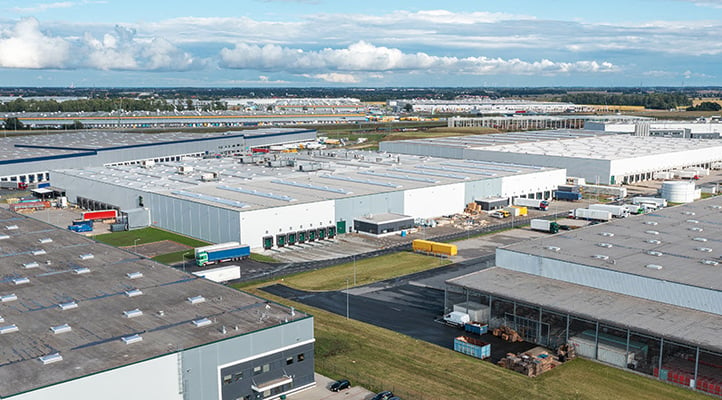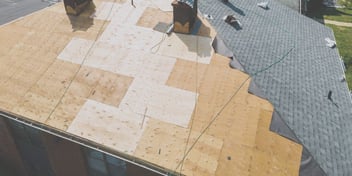- Home »
- Learningcenter »
- Single multi ply roofs
Single-Ply Roof vs. Multi-Ply for Commercial Roofs in Atlanta

The right roofing system can make a difference for your commercial building in the city of Atlanta. Single-ply and multi-ply roofs each give you options that are customized to your liking. Your building's requirements will help you choose which roofing type can give you the best lifespan and performance.
The right roof can also affect your building's efficiency and maintenance costs. I'll get started by looking at things like climate durability, budget, and design compatibility. I'll look at the facts to find the best roof for your commercial space and for your long-term security. These will help you make a choice that's best for you.
Ready to level up your roof? Let's get started!
Single-Ply Roofing Basics
Your building should have a single layer of waterproof material for protection with single-ply roofing. The installation moves ahead much faster without any heavy materials because Atlanta contractors love these systems. You'll get a membrane that's made from synthetic materials like TPO, PVC, or EPDM.
TPO roofing works beautifully for your Atlanta property in the warm climate, and this material works well with sunlight and keeps your building cool and comfortable during those scorching Georgia summers. Think of it as putting a light-colored umbrella right over your building instead of a dark one. The material holds up well to those pop-up summer thunderstorms we get here.

PVC can give you another good option with strength. Your contractors will heat-weld the seams together so water doesn't stand a chance of getting inside. You'll pay more than with some other options. But your lifetime warranty and the quick installation time make it feel worth the cost.
EPDM is the most affordable option since it's made from synthetic rubber. The dark color can absorb heat instead of reflecting it away. It's a poor fit for those steamy Atlanta summers you have.
Your building's structure won't need to work as hard with these lightweight single-ply systems. Wide sheets mean there are fewer seams where water might sneak in. The installation process can give you some options as well. Your contractors can glue the membrane down, hold it in place mechanically, or even weigh it down with gravel.
Single-ply roofs look sleek when they're finished. The surface can remind you of a smooth vinyl floor - especially with those white TPO or PVC roofs. Next time you're flying into Atlanta, look down at the bright white roofs standing out against the darker traditional ones. These reflective surfaces also help to cool down the entire city by pushing back against urban heat buildup.
Single-Ply Strengths And Weaknesses
You'll save some time and some money with single-ply roofing systems in Atlanta because they're faster to install and also cost less first. These lightweight roofing systems are perfect for your business - especially when you need to get back to work a little bit faster.
Your building's structure likely won't need any expensive reinforcement with single-ply roofing because it's so light. Most contractors can finish the installation in just a few days. This means less disruption to your day-to-day operations.
Multi-ply roofing systems deliver good toughness and durability. Multiple layers of material create an extra-strong and protective shield for your building. This added protection helps during Georgia's tough summer storms and those surprise winter freezes we all get.

Money is likely your biggest concern as an Atlanta business owner. Single-ply systems are cheaper, and their reflective surfaces help cut back on energy costs. Keep in mind that you might need more maintenance visits and an earlier replacement compared to multi-ply systems.
With these roofs, all systems come with their own maintenance tasks. Your single-ply roof might get damaged more often from fallen branches or people walking on it.
Multi-ply roofs are tougher. But when something goes wrong, repairs can take longer and also cost a little more. Atlanta's scorching climate can affect energy costs, too.
Single-ply materials like TPO and PVC work well with reflecting sunlight. This helps your building stay cooler and your summer AC bills lower. Your roofing choice should also factor in Atlanta's weather patterns.
Those quick summers and regular thunderstorms mean the roof needs to manage wild temperature changes and heavy rain. Multi-ply systems stand stronger against harsh weather. Single-ply roofs need precise installation to stay away from seams splitting during serious storms.
Multi-Ply Roofing
Multi-ply roofing works just like layering up your clothes for the terrible weather. Each layer can add a bit more protection, with tough and sturdy materials like asphalt and felt stacked together to help protect your building from nasty weather, heavy rain, and strong winds.
You'll love how these roofs also come with a kind of built-in backup plan. Even if something happens to tear through the top layer, you can still have a few more layers to keep your building safe and dry. This extra protection comes in handy during Atlanta's wild and very unpredictable storm season.
Multi-ply roofs haven't stuck around for 175 years without good reasons. These tough roofs can shrug off pretty much anything Mother Nature throws their way. You'll see they perform well during storms and the worst weather conditions. The very strong surface lets you add solar panels, create some welcoming rooftop gardens, or even set up outdoor areas where your employees can hang out.

A multi-ply roof can give you some possibilities. The tough surface works with foot traffic and some kinds of heavy equipment. Most building owners end up spending far less on basic repairs than they would with other types of roofs.
You might spend more of your money upfront for a multi-ply roof. But these systems pay off in the long run. These tough systems also hold up strong for decades with just maintenance.
Multi-ply roofs also work well for keeping your energy bills down in Atlanta's brutal heat. The layered design traps air between each level and creates insulation that helps your building stay cooler. Your air conditioning won't need to work nearly as hard during those scorching and very long summer months.
Multi-Ply Pros And Cons
Your investment in a multi-ply roof for your commercial building can pay off in the long run! These systems might cost more. But they'll save you money and problems over time.
A multi-ply roof works just like layering up your clothes on a cold day. You can stay warm and protected even if your outer layer gets damaged. The same goes for your building. Those extra layers will work to stop any water from getting in, even if the top layer takes a hit.
Joanne, a property manager I recently talked to in downtown Atlanta, knows what she's talking about. Her building hasn't had any leaks since she switched to multi-ply roofing five years ago. Before that, she was always fixing leaks every spring when the storms came in.
Your multi-ply roof won't buckle under the pressure either. It's strong enough to hold up heavy equipment and solar panels. Those thick layers also pack insulation, so you'll see your energy bills drop all year round.

Multi-ply roofs do come with some limitations. You'll need to set aside extra time for the installation. You'll want the experts to manage the job. The materials aren't eco-friendly, and some buildings weren't designed to manage that kind of weight.
The protective granules on your multi-ply roof will eventually wash away. When this happens, the dark asphalt underneath will start to show and will absorb heat faster. Here in Atlanta's hot climate, that means your cooling costs might slowly creep up as your roof gets older.
A multi-ply roof will keep repair teams off of your property for years at a time. While the installation takes longer, you'll spend much less time worrying about repairs and replacements later on.
Which Roofing Suits Your Building?
The size of your structure will affect your choice between single-ply and multi-ply options when you're picking a roof for your Atlanta commercial building. The bigger buildings need the extra stability that multi-ply roofs give you, while smaller buildings work well with single-ply systems.
The weight of your roof matters, too. Multi-ply systems will be heavy with their multiple layers, so your building needs strong and sturdy structural support. A single-ply option can give you a lighter answer that won't stress out your building's frame.
Cost can help now and later. You'll spend less money with single-ply roofs, and the installation moves faster. Multi-ply systems cost more to install. They usually last longer and need less repairs along the way.
Atlanta's weather can test your roof to its limits. A single-ply roof works with sunshine and rain like a pro. Multi-ply systems can give you an extra shield against harsh weather with those extra layers. Your future building plans should lead your choice.

Single-ply roofs make it easy to add solar panels or other upgrades later on. You won't have problems modifying them if you choose to expand your building.
The installation timeline can affect your day-to-day business operations. A single-ply roof goes up faster with minimal disruption to your operations. Multi-ply systems will need more time and workers on-site to get everything completed.
Each roofing type has its own vulnerable areas. Your single-ply roof might get punctured more, but repairs are usually quick. Multi-ply systems stand up better to damage, even though they might develop hard seam problems over time.
Atlanta's heat puts your commercial roof to the test. Your single-ply materials often come with reflective surfaces that help you save money on air conditioning. Multi-ply systems give you stronger insulation, but they don't usually have the same energy-saving features.
Installation Tips And Maintenance Insights
A single-ply roof can give you some of the biggest value when you need a quick installation. Your roofing crew can usually finish a standard commercial building in just a few days, and it lets you get back to your business fast.
Multi-ply systems will need time and expertise from your contractors. Because these roofs need a few layers working together, your crew needs extra attention during the installation. You'll spend double the installation time compared to single-ply systems.
Mike, a commercial roofer I spoke with in Atlanta, shared some plans from his 20 years in the field. His experience shows that single-ply installations can leave new crews with room to learn without taking a risk with expensive mistakes.

Your maintenance schedule will look different depending on which system you choose. Single-ply roofs need your eyes on them to find any tears or punctures. A small hole could mean serious water damage tomorrow if you don't find it fast. Your business can continue operations during a single-ply installation.
Multi-ply roofs can give you some reliable protection against damage. But you'll still need to watch out for problems. The layers might separate over time, and water could sneak between them without anyone finding it.
Your roofing team just needs to roll out the membrane, and they'll protect it along the way. They're often done while your employees work away below. Multi-ply projects bring more disruption to your operations. The hot tar and extra materials create noise and mess, so you'll probably need to adjust your business schedule during the installation.
Each system will need different levels of expertise. Your single-ply installers need basic roofing skills with close attention as they roll out and protect the membrane. Multi-ply installations call for the knowledge of how different materials work together and the exact layering technique necessary for the best protection.
Atlanta's scorching summers and regular storms will test any roof you choose. Your single-ply roof should be inspected every six months to ensure it stays in good shape through tough weather patterns.
The Environmental And Structural Factors
Atlanta's weather plays a very giant role in your roofing options. Your building will face non-stop challenges from the high and humid conditions and regular storms, too. These weather conditions will test your roof's durability, and you'll need to plan ahead to avoid problems down the road.
Your building's structure can also affect which roofing system you'll actually be able to use. Single-ply roofs usually weigh less than the multi-ply systems. Atlanta buildings can't manage the extra weight of a multi-ply system, so you'll need to check your structure's load capacity first.
Local building codes will lead your commercial roofing decisions as well. The rules cover safety requirements and also water drainage systems. Your building's shape can also affect how water flows off the roof, and you'll want a system that works to fit your structure.

Atlanta business owners have recently made energy costs a big focus. Single-ply materials like TPO and PVC also work well with directing sunlight away from your building. This reflection helps keep your space cooler during those sweltering Georgia summers, and it cuts back on your AC costs, too.
Rain protection is pretty big in the Atlanta climate. While single-ply roofs do a good job of keeping water out, multi-ply systems give some extra security. The multiple layers will work together to block moisture from entering your building during one of the intense summer thunderstorms.
The installation process should factor into your choice as well. Single-ply roofs can usually take less time and fewer workers to install. However, multi-ply systems will need more labor hours and higher installation costs. In return, you'll get multiple layers of protection against Georgia's weather.
Protect The Roof Over Your Head
You'll need to find your top goals, whether that's a quick installation time, staying within the budget, or even needing a roof that can manage Atlanta's tough weather. Your building's requirements will help point you toward the right roofing option.
Building owners can sometimes lose themselves in the technical facts instead of focusing on things that actually matter. The big questions have to come first. How many years will you use this? What kind of maintenance can you manage? Which roofing system will give you the most protection and security? A perfect choice exists for every situation.

We at Colony Roofers will help you find that perfect match. We're commercial and residential roofing experts with offices located in Georgia, Florida, and Texas. Your investment and safety mean too much to trust just anyone. Our professional team will help protect your interests with easy advice and quality installation services. Contact us for your free inspection.
 Call (678) 365-3138
Call (678) 365-3138



